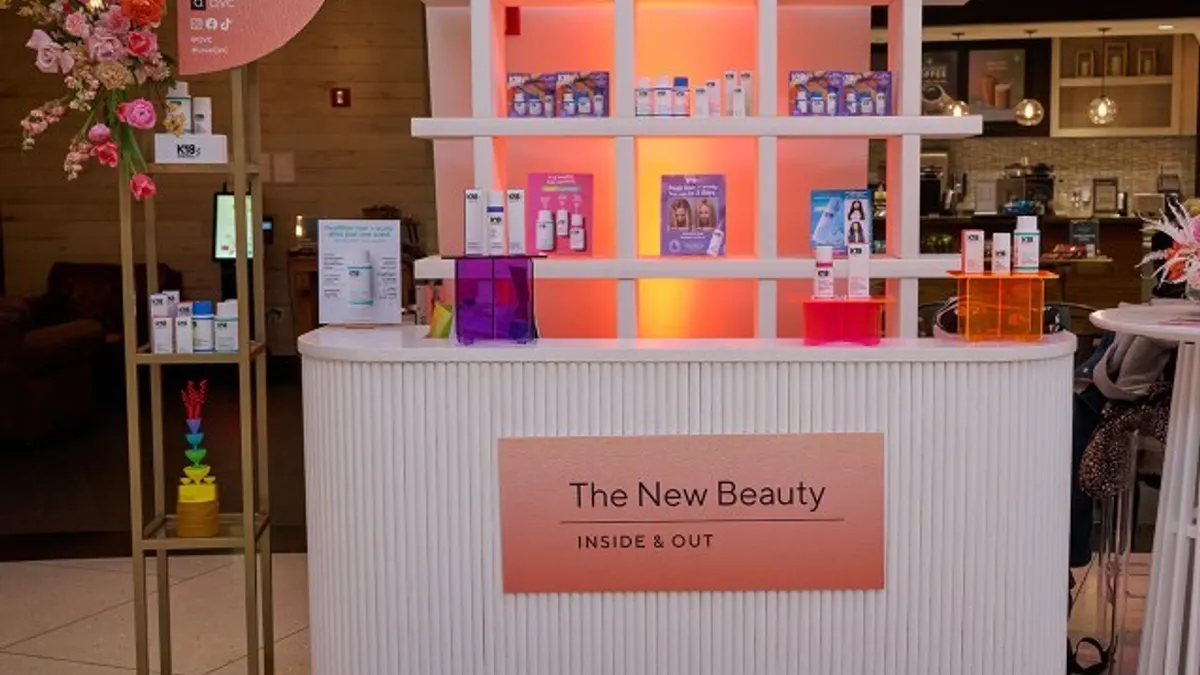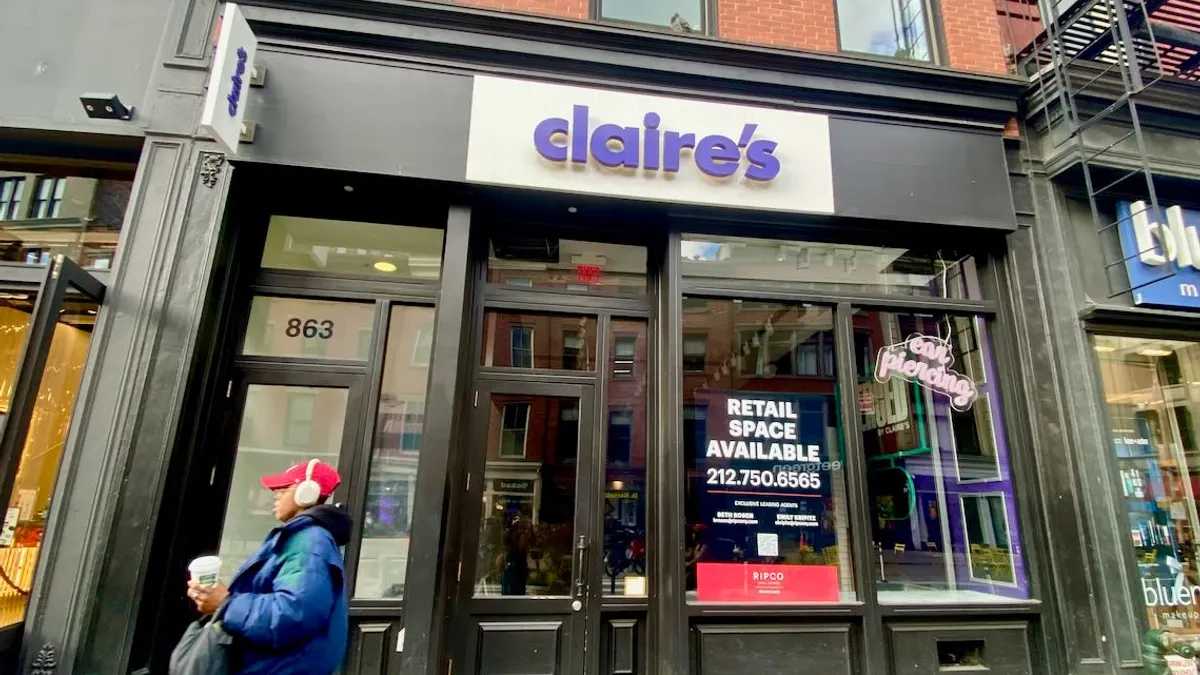There was a sense of evolution at L Brands Tuesday as executives and investors gathered in the company's hometown, Columbus, Ohio, for its annual shareholders meeting. Yet it remains to be seen if changes afoot at stalwart lingerie brand Victoria's Secret will be enough, or are coming in time to stem the market share loss it's suffered in recent years.
Newly arrived brand chief John Mehas unveiled changes to merchandise and stores at Victoria's Secret that he said at long last addressed the consumer shift to prettier styles, away from the sexualized marketing and glamazon models the brand has long been known for. The company is partnering with third-party brands to help it cross that bridge. But he also expressed a sense that the brand doesn't want to go too far.
"There's an opportunity to take a step back and reinvigorate the brand," he said, noting a consumer environment that favors inclusivity and has been shaped by the #MeToo movement. "We're essentially in agreement, [but] it's a fine line, and we're being thoughtful about what that looks like."
Things at Pink, the subbrand developed to appeal to younger women and teen girls, are more clear. Brand chief Amy Hauk at several points touted a theme of empowerment and embraced marketing that reflects "real bodies, real life experiences" including transgender shoppers and people with bodies of all types.
"And that's that everyone counts and that's a broad swath of diversity, from all angles," she said, calling such inclusivity "classic, iconic American tradition. We want it to be authentic and transparent."
It's complicated
Hauk may have more room to make such a shift. Pink, aimed at much younger consumers compared to Victoria's Secret, never depended on the male gaze the way the more mature brand has. And the success of American Eagle's Aerie, which has taken share in the market by eschewing altered images and developing styles more attuned to current tastes, offers a blueprint.
For Victoria's Secret, changes are more complicated because, no matter how necessary, they pose some risk to its enduring power in the market. As L Brands CFO Stuart Burgdoerfer noted on Tuesday, the brand is by far the global leader in lingerie, with $4 billion in global sales, more than 400 million store visits and more than a billion web visits each year, dwarfing results from new competitors like ThirdLove and Adore Me. Still, growth is slipping. This past spring, lingerie comps including Pink were down 6%, merchandise margins were down "low double digits" and "operating income down substantially," the company said.
The brand wasn't helped by L Brands founder Les Wexner's friendship and financial ties with Jeffrey Epstein, whose death in prison last month was ruled a suicide. Wexner sought to prevent any focus on that by opening the event with remarks distancing himself from the disgraced financier and convicted sex offender. The relationship "happened a long time ago," he said, adding that he was "embarrassed" to have been "taken advantage of by someone who is so sick, so cunning and so depraved."
Is it enough?
The changes at Victoria's Secret are long overdue, according to Lee Peterson, WD Partners executive vice president, thought leadership and marketing, who spent years working with Wexner at The Limited. "Well, A) that's good to hear," he told Retail Dive in an email about the changes discussed Tuesday. "But B) what took you so long? The writing's been on the wall for about 8 years, and as Les used to preach to us, 'don't wait till your business falls apart to change — move to next before the customer.' They should've paid heed to their own credo. But it's a great brand with terrific leaders and powerful market share — what's not to like now that the train's on the right track?"
The question remains, though, whether that train is moving fast enough, or if changes at Victoria's Secret, in both merchandise and marketing, are indeed on the right path, according to MKM Partners Managing Director Roxanne Meyer.
That brand is now "more focused," but "no changes have been made to the marketing strategy," she noted in comments emailed to Retail Dive, citing the departure only last month of longtime L Brands marketing chief Ed Razek. While the brand's now-infamous fashion show was put on hold for the year, its future, or any replacement of the show or its ethos, remains unclear.
"[I]nitial brand direction is a 180 degree turn vs. spring. Yes, it is glamorous, emotional and highly differentiated ... but is this what the masses want?" Meyer said. "We note the more fashion-forward and sexy pieces from prior leadership didn't work well, and the company walked away from sexy sleep a few years ago given a lack of customer interest. Even if the product/vision does take hold, it could take several quarters to wean customers off of the intense promotional activity they expect."
Markdowns have become a problem at Victoria's Secret, and regaining the ability to fetch full price emerged as a priority.
"If I'm really close to the customer and I really know my customer perfectly well, you'd have zero markdowns and the quantities would be right," Wexner said. "If markdowns go up or if turns slow down it means we're not tracking with the customer. We have too many errors."
While he also defended markdowns, saying they're the only way to sweep away those errors and start anew, he called them "the largest expense we have," overshadowing tariffs and transportation costs in their impact.
New spin on Bath & Body Works
The turmoil at the company's lingerie segment stands in stark contrast to the runaway success of its Bath & Body Works personal care unit, which, as brand chief Nick Coe put it on Tuesday, is "ludicrously powerful," with nearly $5 billion in global retail sales, more than 350 million store visits and more than 300 million web visits each year.
While in the past the company has resisted calls to split off that brand, executives refused to rule it out on Tuesday. Wexner called such a move "a significant board decision that's always under review."
"Clearly there would be arguments for those kinds of separations at different times," he said.
In fact, MKM's Meyer thinks it's probably under serious consideration. "While likely not the preferred route, we think the board is weighing a spinoff of BBW — likely driven by a combination of a trigger stock price and/or lower confidence in a VS recovery following the next few quarters," she said, adding that any "success of a Madewell IPO could tip the scales."






















